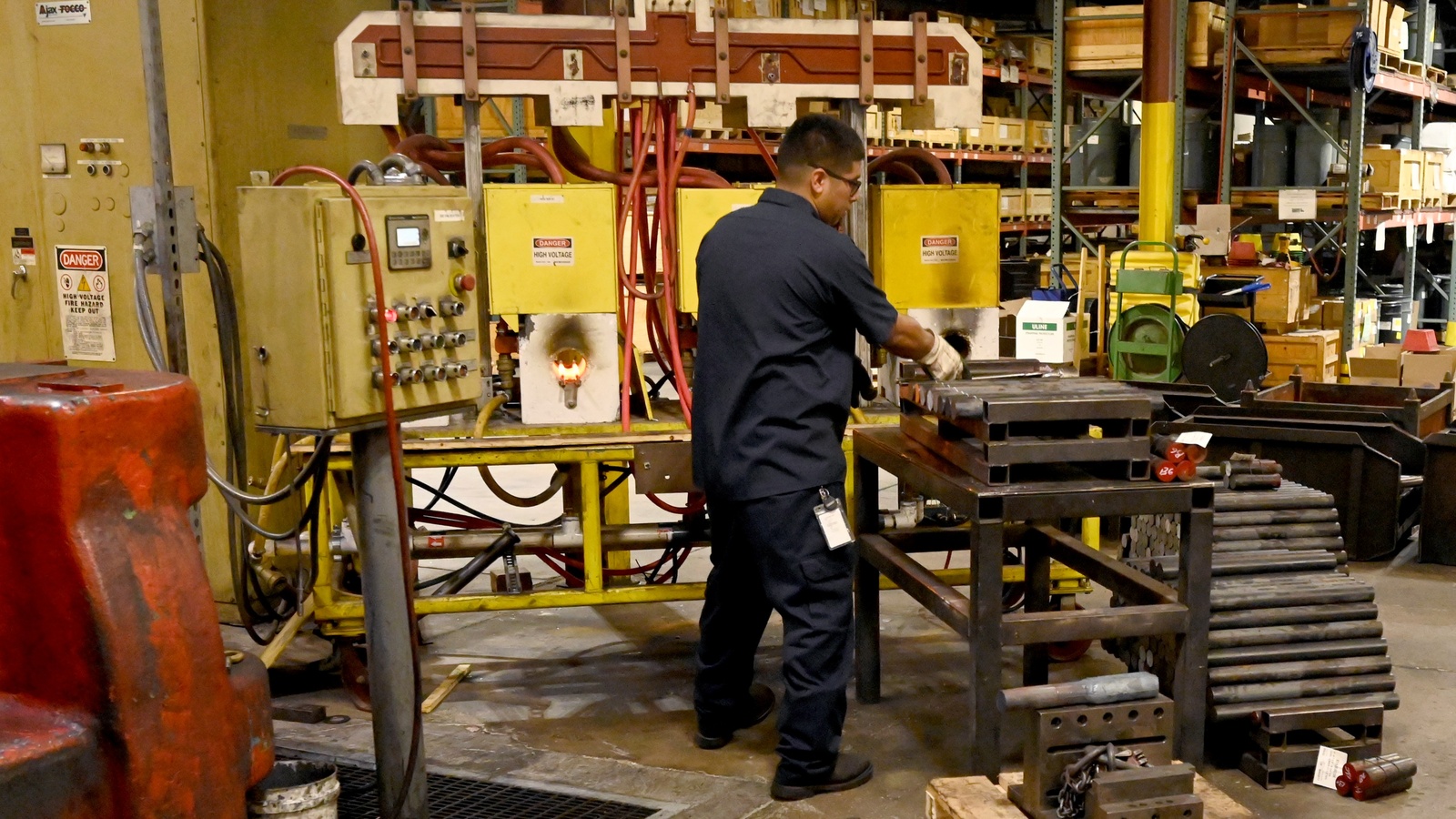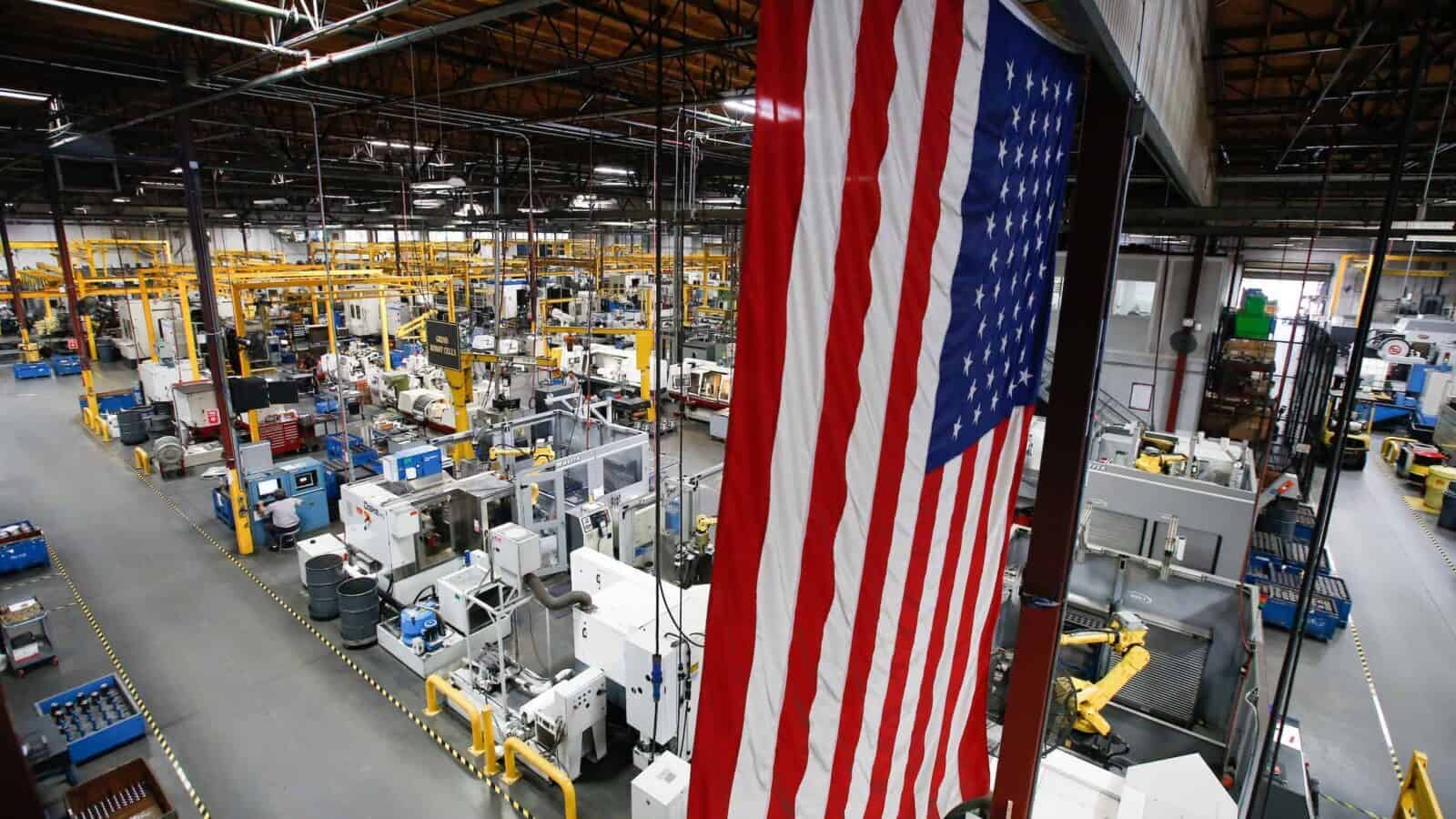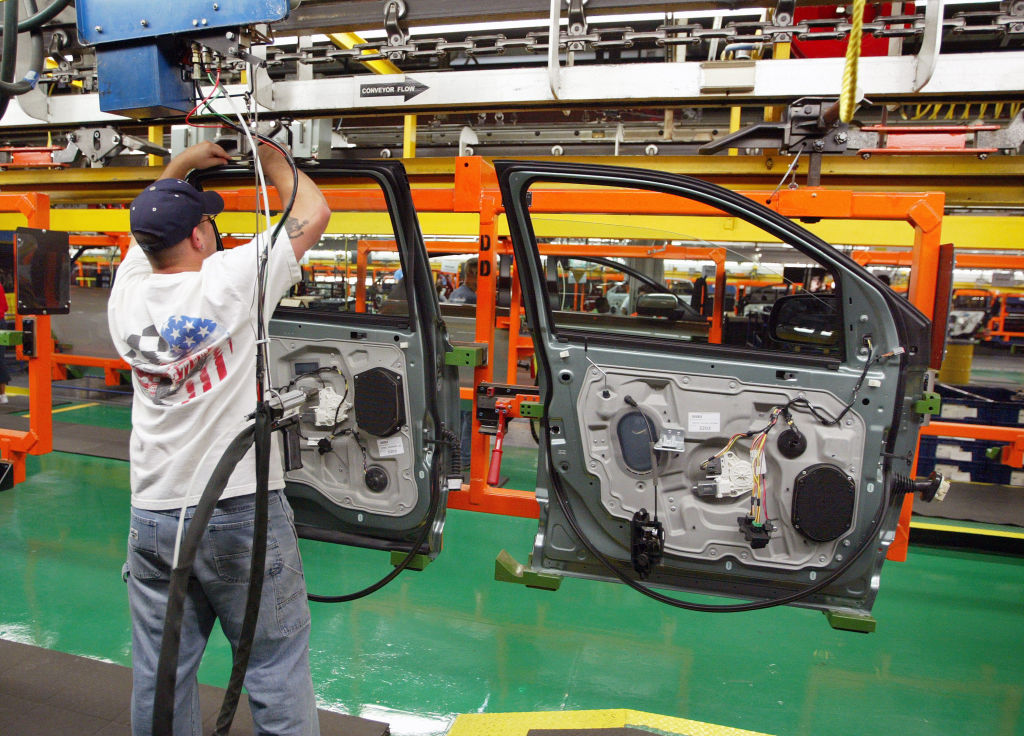NEW: Arizona Snap Poll Shows Manufacturing Voters Strongly Oppose Reconciliation Tax
Washington, D.C. – The National Association of Manufacturers and Arizona Chamber of Commerce & Industry released a new snap poll today showing that an overwhelming majority of manufacturing voters in Arizona disapprove of the U.S. Senate’s plan to raise taxes on manufacturers. More than 90% of manufacturing voters opposed the tax, while 91% agreed that the tax would harm manufacturers’ ability to invest in their business, buy new machinery and upgrade facilities and put manufacturing jobs and economic recovery at risk.
“With the U.S. and Arizona economy already showing signs of weakening, this is the wrong time to further undermine growth and the manufacturing sector’s overall competitiveness. As the nonpartisan Joint Committee on Taxation analysis has shown, the corporate minimum tax is disproportionately focused on manufacturers and will limit the sector’s ability to grow and invest—in Arizona and across the country,” said NAM Chief Economist Chad Moutray. “As the survey shows and as other data indicate, it will make it harder to hire more workers, raise wages and invest in our communities. Arizona’s manufacturing voters are clearly saying that this tax will hurt our economy.”
According to recent analyses by the Joint Committee on Taxation and the NAM, the “corporate minimum tax” currently under consideration in the U.S. Senate will largely fall on the backs of manufacturers, cost almost 220,000 jobs and reduce GDP by nearly $70 billion, while reducing labor income by over $17 billion in 2023 alone.
“Arizona job creators will continue to urge lawmakers to reject this manufacturers tax and instead focus on policies that encourage job growth and strengthen our state and national economic competitiveness,” Arizona Chamber of Commerce & Industry President and CEO Danny Seiden said. “In the face of record-high inflation, supply chain backlogs and a major labor crunch, now is not the time to hammer manufacturers with new taxes.”
Background/Methodology:
Conducted by the NAM analytics team, this snap poll collected 223 responses from a statewide sample of Arizona manufacturing workers, managers and advocates. In total, 80% of the responses came via SMS text to web and 20% came via email.
-NAM-
The National Association of Manufacturers is the largest manufacturing association in the United States, representing small and large manufacturers in every industrial sector and in all 50 states. Manufacturing employs more than 12.8 million men and women, contributes $2.77 trillion to the U.S. economy annually and accounts for 58% of private-sector research and development. The NAM is the powerful voice of the manufacturing community and the leading advocate for a policy agenda that helps manufacturers compete in the global economy and create jobs across the United States. For more information about the NAM or to follow us on Twitter and Facebook, please visit www.nam.org.
Tax Reform Bought a Manufacturer New Equipment and a Brighter Future

The oldest forging machine at Phoenix manufacturer Valley Forge & Bolt dates all the way back to 1930. Plenty of other forging equipment was bought used and then refurbished to help the business keep down costs and maintain its generous benefits for employees. In fact, this type of equipment is the most expensive outlay of capital for the company, according to CEO Michele Clarke.
Thanks to the 2017 tax reform law, however, Valley Forge was able to buy new forging equipment for the very first time. It is “a huge game changer,” said Clarke, “when you can buy state of the art equipment.”
She said as much to Senator Kyrsten Sinema, during the senator’s visit earlier this month to Valley Forge’s facility. Along with CFO Byron Harrod, Clarke spoke to us recently about tax reform’s full range of benefits for their company—and why policymakers should not threaten the gains they and other Arizona manufacturers have made.
A small manufacturer on the rise: Valley Forge is poised to have its best sales year in its almost 50-year history, thanks in large part to the new equipment. Though the pandemic put a temporary dent in its progress, it has seen a marked jump in sales since 2017.
- The company also boosted its employment by 15 to 20% in 2018, rising to 100 workers for the first time, according to Harrod.
Benefits secured: The company makes a point of providing expansive health care coverage, with only a nominal fee for employees. The savings from tax reform has helped it maintain this commitment to employee health, as well as its 401(k) match program.
- Meanwhile, workers benefit directly from the increase in sales as well. The company has a longstanding incentives program, handing out quarterly bonuses once key goals are met.
- “Every employee gets money back if we do well,” as Clarke put it.
A better place to work: The new equipment has made Valley Forge not only more productive and profitable, but also a more comfortable working environment.
- One of the machines it purchased was robotic equipment to grind bolts. “Worst job in the company,” said Clarke. The grinding process removes forging flash so the bolts don’t cut people when handled, and it involves a lot of flying metal chips.
- “The robot probably costs close to $300,000, and we had to build a special room,” she added. It’s taken a whole year for engineers to program and set up the machine, but the benefits are worth it—“it replaces jobs that nobody wants to do.”
How tax reform helped: In addition to the lower corporate tax rate, certain other provisions in the law were crucial to the company’s equipment purchases.
- Take full expensing, which allows companies to deduct the full cost of equipment in the year it is bought. “We went each year [since tax reform] to the maximum for full expensing, sometimes more,” said Harrod.
What’s next? The company must keep adding new capacity, said Clarke, so that it doesn’t join the four or five bolting companies that go out of business around the U.S. each year. “We stay alive because of the technology we’ve developed, and we keep making it more advanced.”
- The company is beginning to produce fasteners with Bluetooth or radio frequency wireless, which can transmit information about their load and whether they have come loose right to your phone.
- It’s hoping to market these fasteners to the wind industry: “They have men who climb up the towers to tighten the bolts,” Clarke explained. “But the work life in that job is a year and a half.”
- Thanks to the new bolts, these workers would only have to make that daunting climb when they know the bolts are loosening.
This is why even the threat of a tax increase is so damaging to manufacturers, according to Clarke and Harrod. They need to be certain that their tax burden will not go up in order to plan confidently for the future.
- “Planning is paramount,” Clarke reinforced. “It takes maybe two years from when a customer first sees [a new product]” until they put in an order.
The NAM says: “Valley Forge is yet one more example of how the 2017 tax reform law helped to power growth for manufacturers,” said NAM Senior Director of Tax Policy David Eiselsberg. “Unfortunately, Congress is considering a major tax on the manufacturing sector that if implemented would reverse the gains from tax reform and hurt the sector’s future competitiveness. As it has done for the better part of year, the NAM will continue to fight against tax increases targeting manufacturers.”
The bottom line: When policymakers start talking about tax increases, “You start to cut back, you think about not replacing engineers who leave,” said Clarke. “You think the government is not on our side; let’s just cut back and make do.”
Book Tax Would Disproportionately Burden Manufacturers

The proposed “book tax” in the Senate’s reconciliation bill “would overwhelmingly hit U.S. manufacturers,” according to a new analysis by the Joint Committee on Taxation, Congress’s non-partisan tax scorekeeper.
What’s going on: The reconciliation bill, the outline of which was released Wednesday by Senate Majority Leader Chuck Schumer (D-NY) and Sen. Joe Manchin (D-WVA), proposes a 15% minimum corporate levy, or “book tax,” on certain companies.
- The provision is estimated to raise $313 billion, and JCT finds that manufacturers would be responsible for paying nearly half of it.
What it means: The impact would be swift and devastating to manufacturers and the economy as a whole, said NAM Chief Economist Chad Moutray, who conducted his own analysis of the bill’s effects on the manufacturing sector.
Including direct, indirect and induced effects, in 2023 alone the impact would include:
- A real GDP reduction of $68.45 billion
- 218,108 fewer workers in the overall economy
- A labor-income decrease of $17.11 billion
Targeting manufacturers: “‘This is a domestic manufacturing tax, plain and simple,’” said Senate Finance Committee Ranking Member Mike Crapo (R-ID), who asked for the JCT analysis.
- “Despite Democrats’ claims, the book minimum tax does not close tax loopholes. Treatment of capital investments, like those made by American manufacturers, differ for book and tax purposes—for good reason,” according to a press release from Senate Finance Republicans.
- “Congress intentionally designed tax depreciation rules to support domestic investment. Democrats’ tax on U.S. manufacturing would eliminate that benefit.”
Exclusive: Sinema Meets with Manufacturers in Arizona, Talks Policy with the NAM
U.S. Senator Kyrsten Sinema (D-AZ) recently got an in-person look at manufacturing’s success in Arizona on a NAM-arranged tour of Phoenix manufacturer Valley Forge & Bolt. During her visit, which also featured a roundtable with manufacturers from across Arizona, she spoke with the NAM about the successful passage of historic infrastructure legislation without tax increases, the necessity of boosting semiconductor production and more.
- During the roundtable, Valley Forge & Bolt President and CEO Michele Clarke highlighted the direct impact of the 2017 tax reforms on her ability to invest in her facility and workforce. She thanked the senator for standing against future tax increases on manufacturers and for her leadership on infrastructure investment.
The NAM caught up with the senator after the roundtable for an exclusive interview. Here is some of what she said.
Infrastructure in Arizona: “We’ve got over $5.3 billion coming just to improve our roads and bridges in Arizona,” said Sinema. “That’s critical for the work we’re doing to shorten the supply chain. The benefits of this law will be seen for years to come.”
- “It provides a real opportunity for manufacturing businesses in Arizona to be able to utilize this energy and these dollars we’ve created to move forward, attract more companies to Arizona, and become a world leader in manufacturing.”
What’s next? “My number one goal now that this [infrastructure] bill has become law is to make sure that it’s implemented quickly, swiftly, and without bureaucracy,” said Sinema.
- “I want to make sure Arizona is getting its fair share of dollars so that the men and women who are running and working for our manufacturing companies can put these dollars to good use and make sure Arizona retains and grows its status as a domestic manufacturer.”
Creators Wanted: “There’s a need for us to really focus on investment in our education system so that we’re training the highly qualified tradesmen and tradeswomen who can do the work of this domestic manufacturing,” said Sinema. “That’s an area where we have an opportunity to grow, not just here in Arizona but across our nation. To meet this need so we can retain our global independence and competitiveness.”
Chips: “Arizona is already a hub for the microchip and the semiconductor industry; but passing the CHIPS Plus legislation will allow us to triple or even quadruple that investment,” said Sinema. “It’s incredibly important for us—not just for the tax credit and the investment in R&D—but for the tech hubs, for the investment in science, and to help attract more companies to build semiconductors right here in Arizona.”
The last word: “Manufacturing is the bread and butter of our state,” said Sinema. “It ensures that Arizona is a hub to the nation and the entire world in making products that will power our economy for the future.”
Read more: Check out the local coverage of the senator’s visit from the Daily Independent and the Phoenix Business Journal (subscription).
Manufacturers: Legislation Is a Bold, Important Step Toward Ramping Up the Domestic Manufacturing of Essential Inputs
Timmons: Every manufacturer will benefit. But there is more to be done.
Washington, D.C. – Following the House’s passage of the CHIPS-Plus Act, National Association of Manufacturers President and CEO Jay Timmons released the following statement:
“This legislation is a bold, important step toward ramping up the domestic manufacturing of essential inputs used by virtually every part of our industry. Every vote for the CHIPS-Plus Act was a vote for a more competitive manufacturing industry in America. This bipartisan legislation shows that Congress is taking the problems of supply chain disruptions and inflation seriously. Every manufacturer will benefit. But there is more to be done.
“Once President Biden signs it into law, manufacturers will work with lawmakers to build on the momentum and continue our advocacy for important measures that did not make it into the final CHIPS-Plus legislation, including trade measures, anti-counterfeiting protections and other workforce development priorities.
“But if lawmakers are truly serious about competing with China, they will now oppose the tax increases and attacks on pharmaceutical innovation in the latest reconciliation bill proposal, which will certainly lead to continued inflationary pressures. Congress should stay focused on bipartisan solutions, not legislation that weakens our economy and makes us less competitive with other countries.”
-NAM-
The National Association of Manufacturers is the largest manufacturing association in the United States, representing small and large manufacturers in every industrial sector and in all 50 states. Manufacturing employs more than 12.8 million men and women, contributes $2.77 trillion to the U.S. economy annually and accounts for 58% of private-sector research and development. The NAM is the powerful voice of the manufacturing community and the leading advocate for a policy agenda that helps manufacturers compete in the global economy and create jobs across the United States. For more information about the NAM or to follow us on Twitter and Facebook, please visit www.nam.org
Manufacturers: Lawmakers Who Support Manufacturing in America Should Oppose This Reconciliation Bill
Washington, D.C. – Following news of a potential reconciliation agreement among Senate Democrats, National Association of Manufacturers President and CEO Jay Timmons released the following statement:
“This proposal is nothing more than a repackaging of the same bad ideas with a new name slapped on it. It is especially harmful because it will undermine manufacturers’ competitiveness at a time when the industry is reeling from supply chain disruptions and record inflation. Manufacturers kept our promises after the 2017 tax reforms, hiring more workers, investing in our communities and raising wages and benefits. Raising taxes now will hurt manufacturers’ ability to keep delivering for our people and mean fewer opportunities for Americans already worried about their financial future.
“Government price controls on pharmaceutical manufacturers are no less destructive. They will weaken our ongoing work to develop lifesaving cures to complex diseases like cancer and Alzheimer’s and harm our responses to health crises. It’s bad for Americans’ health. It’s wrong for our economy.
“While the language purportedly calls for comprehensive permitting reform to be passed by the end of the fiscal year, there is nothing that prohibits Congress from doing exactly that right now. Any member of Congress who is voting for the bill based solely on that language should not do so and should instead push to have a standalone bill considered.
“Lawmakers who support manufacturing in America should oppose this reconciliation bill. It will make manufacturing less competitive and America economically weaker.”
-NAM-
The National Association of Manufacturers is the largest manufacturing association in the United States, representing small and large manufacturers in every industrial sector and in all 50 states. Manufacturing employs more than 12.8 million men and women, contributes $2.77 trillion to the U.S. economy annually and accounts for 58% of private-sector research and development. The NAM is the powerful voice of the manufacturing community and the leading advocate for a policy agenda that helps manufacturers compete in the global economy and create jobs across the United States. For more information about the NAM or to follow us on Twitter and Facebook, please visit www.nam.org.
Manufacturers: CHIPS-Plus Act Will Deliver a Powerful Boost to Manufacturers’ Competitiveness
Timmons: It’s encouraging to see this Congress once again come together in a bipartisan way to make critical investments in our industry’s competitive
Washington, D.C. – Following the Senate’s passage of the CHIPS-Plus Act, National Association of Manufacturers President and CEO Jay Timmons released the following statement:
“The CHIPS-Plus Act will deliver a powerful boost to manufacturers’ competitiveness. Manufacturers across all sectors rely on access to chips, so this bill will help strengthen American supply chains thanks to its investments in domestic semiconductor production—as well as its funding for programs to support the STEM workforce, advanced technology development, excavation of critical minerals, clean energy and more. Manufacturers have worked with lawmakers for more than a year to advance many provisions of this bill, and we urge the House to pass it as quickly as possible and get it to President Biden’s desk.
“CHIPS-Plus should only be the beginning, however. We will continue advocating policies needed to beat back economic headwinds such as inflation and supply chain disruption. And we will work with Congress to move quickly on policies from the U.S. Innovation and Competition Act and the America COMPETES Act that were left out of CHIPS-Plus, such as anti-counterfeiting measures, important trade provisions and further investments in supply chain resilience and workforce development.
“It’s encouraging to see this Congress once again come together in a bipartisan way to make critical investments in our industry’s competitiveness and our country’s future. Manufacturers look forward to building on this progress. This and future China competition legislation will help us to innovate, create jobs, expand domestic operations and grow the U.S. economy for years to come.”
-NAM-
The National Association of Manufacturers is the largest manufacturing association in the United States, representing small and large manufacturers in every industrial sector and in all 50 states. Manufacturing employs more than 12.8 million men and women, contributes $2.77 trillion to the U.S. economy annually and accounts for 58% of private-sector research and development. The NAM is the powerful voice of the manufacturing community and the leading advocate for a policy agenda that helps manufacturers compete in the global economy and create jobs across the United States. For more information about the NAM or to follow us on Twitter and Facebook, please visit www.nam.org
NAM Launches Six-Figure Television Ad Campaign Opposing Reconciliation
NAM Urges Senate to Vote “No” on Government Price Controls That Harm Manufacturers
Washington, D.C. – The National Association of Manufacturers has launched a six-figure broadcast and cable television advertising campaign ahead of a potential reconciliation bill that threatens manufacturing innovation and competitiveness. The campaign calls on senators to oppose government price controls that would undermine the development of lifesaving medicines and the livelihoods of manufacturing workers across America who deliver them.
“Government price-setting schemes that undermine our ongoing work to develop lifesaving cures to diseases like cancer and Alzheimer’s and respond to health crises are never the answer,” said NAM President and CEO Jay Timmons. “At a time when manufacturers are already facing extraordinary economic pressures, the Senate should be focused on bolstering our industry’s competitiveness, not undermining it. We are calling on senators to vote ‘no’ on reconciliation and stand with manufacturers and the hardworking Americans who are integral to battling this pandemic and discovering future cures.”
To view the latest television ad, click here.
-NAM-
The National Association of Manufacturers is the largest manufacturing association in the United States, representing small and large manufacturers in every industrial sector and in all 50 states. Manufacturing employs more than 12.8 million men and women, contributes $2.77 trillion to the U.S. economy annually and accounts for 58% of private-sector research and development. The NAM is the powerful voice of the manufacturing community and the leading advocate for a policy agenda that helps manufacturers compete in the global economy and create jobs across the United States. For more information about the NAM or to follow us on Twitter and Facebook, please visit www.nam.org.
What Can Manufacturers Do About Inflation?

Why is inflation happening now? What can we do about it? And how should manufacturers factor it into their plans for the future? The NAM’s Leading Edge program partnered with management consultant company Bain on a recent webinar that answered these questions and more. Here’s a quick recap.
Why it’s happening: According to Karen Harris, managing director of the Macro Trends Group at Bain, inflationary potential was building prior to the pandemic because of declining workforce growth around the world, underinvestment in energy and production and the concentration of supply chains with very few buffers in place.
- Today’s inflation, Harris said, is the result of that “inflationary potential” meeting a series of triggers, including the COVID-19 pandemic and Russia’s war in Ukraine—both of which have destabilized global markets and supply chains.
What it means: Jason Heinrich, a senior partner in Bain’s Chicago office, discussed the challenges that inflation poses to business owners.
- Among these are declining gross margins as costs of goods skyrocket; rapidly increasing labor, energy and input costs; difficult cash allocation decisions; lost sales if product availability decreases; and erosion of customer perception if price increases are too aggressive.
Strategies for success: Bain has analyzed thousands of companies over the past two decades to identify several successful strategies for accelerating performance during periods of disruption and providing future-proof against inflation.
- These strategies include expanding the CFO role to support the C-suite in navigating turbulent times; enhancing growth through customer engagement efforts; being strategic about price increases; building resilient and growth-focused supply chain operations; scaling and doubling down on automation as wages increase; and investing in building the best workplace to attract top talent in a difficult labor market.
- “The research that we’ve done over a couple of decades suggests that the firms and businesses that are on their front foot and playing offense in these periods of disruption outperform their peers over a long period of time,” said Heinrich. “These are moments of truths and moments of opportunity.”
Questions to ask: According to Harris and Heinrich, there are a few critical questions businesses should be asking in the current moment to help manage inflation challenges effectively, including the following:
- How robust is customer demand, and what changes do you anticipate in the next 12–24 months?
- How do you anticipate inflation will impact your business, and what actions can you take this quarter or over the next four quarters?
- How are you assessing resilience, and to what extent should you trade off efficiency for resilience?
- How can you evolve your strategic-planning process to be more dynamic?
Learn more: For more information, check out the full webinar here.
How the NAM can help: If you’re looking for resources to achieve time and cost savings, guard against inflation and help your business solve other current challenges, the NAM’s Inflation Resource Bundle for Manufacturers can help. Click here to find out how.
Manufacturers Support Health Insurance for Older Workers

As the manufacturing industry continues to grow, manufacturers across the country are ensuring that older workers and company retirees have the support they need—including through health care options like Medicare Advantage.
What it is: Medicare Advantage Plans are offered by private insurance companies that have been approved by Medicare. They provide the same hospital and medical insurance as original Medicare, but with additional benefits—often including Part D prescription drug coverage, as well as vision, dental and hearing services. Medicare Advantage Plans also include a maximum out-of-pocket spending limit to offer additional protection.
- Medicare Advantage beneficiaries spend 40% less annually than those enrolled in Medicare Fee-for-Service, while also experiencing a 43% lower rate of avoidable hospitalizations for preventable complications, according to UnitedHealth Group.
- Employers have been able to take advantage of this health care model for retirees by offering what is known as Employer Group Waiver Plans.
Why it matters: Attracting and retaining a quality workforce is one of the most important challenges facing the manufacturing industry, especially as the industry confronts a labor shortage. Affordable and competitive health care benefits are one of many retention tools utilized by manufacturers.
- In 2021, 25.6% of the manufacturing industry’s workforce were 55 or older, while 5.3% were over 65, according to data from the Bureau of Labor Statistics.
- According to the NAM’s latest Manufacturers’ Outlook Survey, 80.7% of manufacturers cited the inability to attract and retain a quality workforce as a primary business challenge.
- The high-quality options provided by Medicare Advantage allow manufacturers to retain their older workers and keep them happy and healthy in their jobs.
What we’re saying: “Ninety-five percent of manufacturing employees were eligible for health insurance benefits in 2020, according to the Kaiser Family Foundation, while 99% of NAM members offer health benefits. Manufacturers are supportive of flexibility, expanding coverage options and enabling innovative models of care to maintain a healthy workforce and provide competitive benefits,” said NAM Director of Human Resources and Innovation Policy Julia Bogue.
For details on other ways manufacturers can retain older employees check out insights from the Manufacturing Institute and AARP here.
